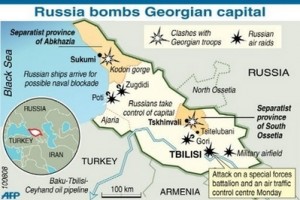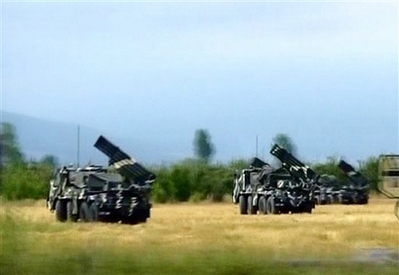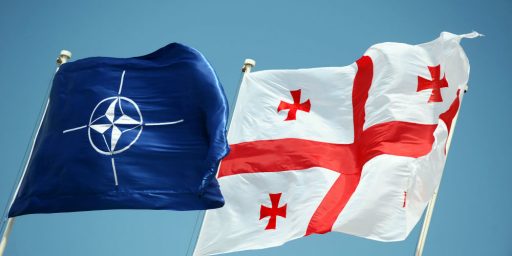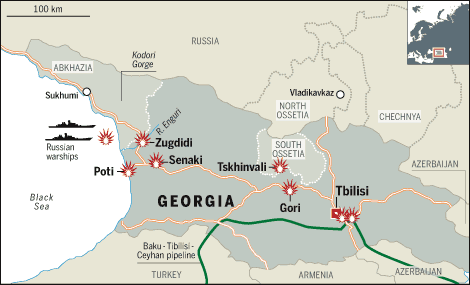Russia Makes Move on Abkhazia
 Emboldened by the lack of international response to its invasion of Georgia to take South Ossetia, Russia has began Phase 2: the taking of Abkhazia.
Emboldened by the lack of international response to its invasion of Georgia to take South Ossetia, Russia has began Phase 2: the taking of Abkhazia.
Swarms of Russian jets launched new raids on Georgian territory Monday and Georgia faced the threat of a second front of fighting as Russia demanded that Georgia disarm troops near the breakaway province of Abkhazia.
While a senior Russian general insisted that Russia has no plans to press further into Georgian territory — its troops are now in two breakaway provinces — the order to disarm carried the threat that Russian-sponsored fighting would spread.
The new air forays into Georgia — even as Georgian President Mikhail Saakashvili on signed a cease-fire pledge — appeared to show Russian determination to subdue the small, U.S.-backed country, which has been pressing for NATO membership. Russia fended off a wave of international calls to observe Georgia’s pleas for a truce, saying it must first be assured of Georgia’s retreat from South Ossetia.
This was perhaps inevitable. Experts have been worried about this eventuality since the West backed Kosovo’s independence declaration. Frankly, from the Russia perspective, it’s hard to blame them for taking advantage of their momentum and the demonstrated weakness of Georgia and its Western backing.
Image: Map showing the latest situation in Georgia. Dozens of Russian warplanes staged new raids in Georgia which in turn pounded the Russian-controlled capital of breakaway South Ossetia, the two sides said, as European leaders intensified efforts to head off all-out war. (AFP Graphic) via YahooNews.






If my previous analogy between this and the Mexican-American war holds true, there will eventually be Russian troops in Tbilisi, and the peace terms will involve Russia annexing South Ossetia and Abkhazia, only because I don’t think Russia will even try to make a show of “purchasing” the regions.
Please, what have they done?
The European’s could not fight off a swarm of locust.
The Western European’s are sitting there, withdrawing from reality, pretending the threat of long-range missiles and home-grown terrorist’s activity does not exist. They will rely on the United States to cover them, all the while protesting our actions while declaring that negotiations and Neville Chamberlain type antics will keep them free and secure.
We have been protecting and defending Europe for over fifty years. Step up and secure your own independence.
“Hard to blame them”?!?
If by that you mean they have an obvious opportunity that they’ve ruthlessly seized and exploited, I agree.
Surely you don’t mean that their conduct is not blameworthy, though!
It would be hard to blame me for kicking that grandmother in the kneecap and stealing her purse last night, either. After all, I saw the roll of cash she put into it when she cashed her Social Security check, and I knew I could out-run her.
Only in the sense that it harms our interests.
Russia views Abkhazia and South Ossetia as illegitimately part of Georgia and the plurality of residents in those provinces agree. From Russia’s perspective, US and NATO intrusion in Kosovo and Bosnia were just as outrageous as we view their incursions here.
Why is so hard to see that this has so little to do with Georgia and its provinces other than providing the convenient excuse for Russia.
This is about overt intimidation and Russia doing exactly what they promised to do in response to former Soviet territories aligning with NATO and accepting the anti-missile installations. Meanwhile, the EU has allowed itself to become dependent on Russian oil and gas and cannot respond to the Russian aggression for fear cutting off its own nose. (Not that they would anyway give their history of the last couple of hundred years.)
The Russians are really, really going to regret this move once the Dementors get their paws on them…
But then, Russians aren’t known for a lot of cherry outlooks at life now, are they?
Dr. Joyner, the last I read, Georgian bombers aren’t bombing Moscow, nor are their tank columns cutting Russia in two.
You’re seriously suggesting that from any perspective, the Russian response is justified and proportionate to anything the Georgians have tried to do in the would-be breakaway provinces?
I take it you also disagree with Robert Kagan’s WaPo op-ed?
What’s next? Celebrating the heroic deaths of those brave German radio station workers in Gleiwitz, slain by those avaricious Polish soldiers in September 1939?
Why does it matter if it was justified or not? What changes?
Those are two different things. Yes there are certainly persepctives where the Russian attack is justified. As JJ pointed out those provinces democratically want to join Russian and Ossetia is opressing them with troops.
Now proportionate is a whole other question. I’m sure some people find it so (namely the Russians) but its a much harder argument to make.
No, that’s a whole different set of questions. And, yes, I essentially agree with Kagan that the Russians saw this as an opportunity to send a much larger message about Western expansion and their own role in the region.
The Russians did have a substantial “peacekeeping” force in South Ossetia and saw a response to Georgian military action as necessary. Have they gone way overboard? Of course.
From the beginning, I’ve framed this as a Russian invasion into sovereign Georgian territory. Still, the precedent has repeatedly been set, mostly by the United States, that international borders, especially those of lesser states, are less than sacrosanct when they conflict with the perceived interests of great powers.